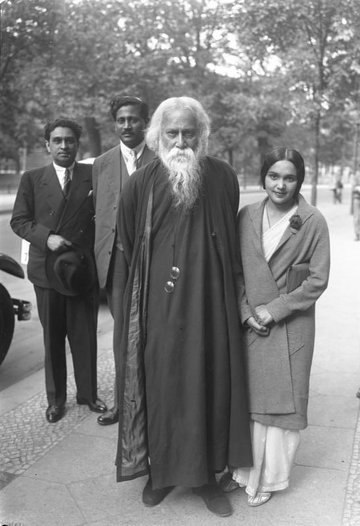
Devika Rani
‐
Notable Indian actress and co-founder of the Bombay Talkies studio, whose film career began in Britain
Other names
Devika Rani Choudhury
Place of birth
Date of arrival to Britain
Place of death
Bangalore, India
Date of time spent in Britain
1925–8
About
Devika Rani was Rabindranath Tagore’s grand-niece and the daughter of the first Indian surgeon general, M. N. Chaudhuri. Rani lived in London in the mid-1920s, studying at the Royal Academy of Dramatic Arts (RADA) and the Royal Academy of Music. She also studied architecture and textile design and was for a while apprenticed to the studio of Elisabeth Arden.
Rani met Himanshu Rai in London in 1928. He had originally trained as a lawyer but had become a film director and asked Devika Rani to design his next film, A Throw of Dice (1929). They married in 1929. The film was edited in Germany where Devika Rani met film directors such as Sternberg, G. W. Pabst and Fritz Lang, which heightened her interest in filmmaking. She subsequently joined UFA studios in Berlin, where she assisted Marlene Dietrich on the set of Der blaue Engel (1930). She also briefly worked with Max Reinhardt. One of the early BBC broadcasts to India included a Devika Rani recital (15 May 1933).
Rai and Devika Rani starred together in the film Karma (1933), which was completed at the Stall Studios in London. The film was the first Indian talkie in English and Hindustani to be released in England, Europe and India. The film had its premiere, attended by the former Viceroy of India Lord Irwin, in London in May 1933, and was well received by the critics and a big hit with the public. After the successful premiere of Karma, Devika Rani was asked by the BBC to act in an early television broadcast in Britain and was also chosen to inaugurate the first BBC broadcast on the short wavelength to India in May 1933.
Devika Rani and Rai returned to Bombay and set up the Bombay Talkies studio in 1934. It was hailed as one of India’s best-equipped studios and enlisted the work of cinema practitioners like the German director Franz Osten and the cameraman Carl Josef Wirsching. The studio also launched the careers of many cinema icons of the immediate post-independence era, such as Ashok Kumar, Dilip Kumar and Raj Kapoor.
After the death of her husband in 1940, Devika Rani became the manager of Bombay Talkies. In 1945 she married the Russian artist Svetoslav Roerich and sold her shares in Bombay Talkies. In 1953 she was awarded the Padamshree and in 1969 the Dadasaheb Phalke Award for Lifetime Achievement in Cinema.
Select filmography:
Prapancha Pash (1929) [costume design]
Karma (1933)
Jawani Ki Hawa (1935)
Achhut Kanya (1936)
Janmabhoomi (1936)
Jeevan Naiya (1936)
Jeevan Prabhat (1937)
Savitri (1937)
Durga (1939)
Anjaan (1941)
Hamari Baat (1943)
Rajadhyaksha, Ashish and Willemen, Paul, Encyclopaedia of Indian Cinema, 2nd edn (London: British Film Institute, 2002)
Varma, Madhulika, 'Obituary: Devika Rani', Independent (26 March 1994)
Wadia, Avabai, The Light Is Ours: Memoirs and Movements (London: International Planned Parenthood Federation, 2001)
Image credit
Devika Rani with Rabindranath Tagore and Himanshu Rai, Germany 1931
Bundesarchiv, Bild 102-11643 / CC-BY-SA 3.0, CC BY-SA 3.0 DE , via Wikimedia Commons
